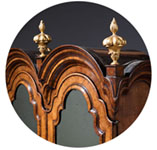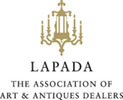Figured Walnut George II 18th Century Kneehole Desk. Circa 1740, England
Sold
Request Information
Follow Us
Figured Walnut George II 18th Century Kneehole Desk. Circa 1740, England
A Fine and Rare Figured Walnut George II 18th Century Kneehole Desk. Circa 1740, England.
The superb age patinated quarter veneered figured walnut top is bordered by a fine holly and ebony stringing, cross-banded, a further stringing of holly and box, cross banded again, and edged with cross-grain ovolo mouldings. Below the brushing slide which is a very unusual and rare feature for a kneehole desk, sits a long oak lined drawer faced with book-matched figured walnut. Similarly, six oak lined drawers bearing their original locks surround the central cupboard which opens on its original shaped and engraved H-hinges to reveal a fitted shelf.
It should be noted that this is an extremely rare example in the most exceptional condition, of superb colour and well patinated throughout.
Condition
Good. Wear consistent with age and use. Sensational colour and patination.
Dimensions
Height: 31.5 in. (80 cm)
Width: 32.29 in. (82 cm)
Depth: 20.87 in. (53 cm)
Literature
‘Early Georgian Furniture 1715-1740’ by Adam Bowett, page 123, plate 3:56.
PREVIOUSLY SOLD
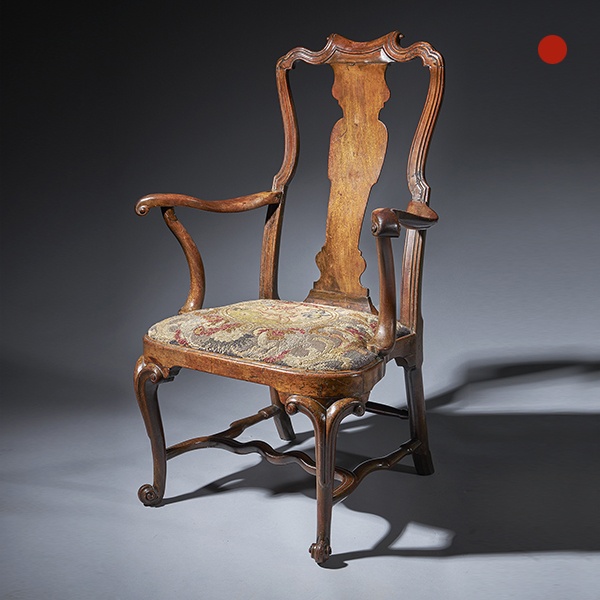
An extraordinary George I walnut armchair Circa 1725, England
An extraordinary George I walnut armchair of fabulous colour, form and patination. The chair is of the most lively shapes being either carved or turned.
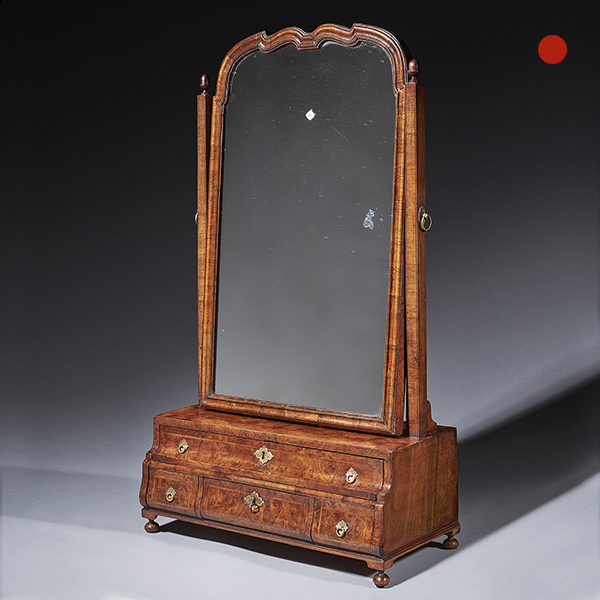
A fine burr walnut George I dressing mirror. Circa 1715-25 England.
A fine burr walnut George I dressing mirror Circa 1715-25 England. SoldFollow UsA fine burr walnut George I antique dressing mirror An extremely rare and fine George I burr walnut dressing mirror raised on ball and bracket feet. The drawer...
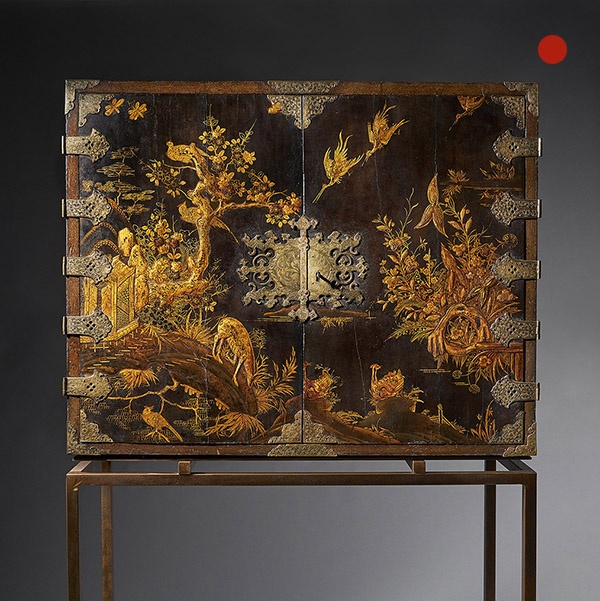
Charles II Japanned Cabinet of exceptional condition c. 1675 raised on a contemporary stand.
Charles II Japanned Cabinet of exceptional condition c. 1675 raised on a contemporary stand SOLD Follow UsCharles II Japanned Cabinet of exceptional condition c. 1675 raised on a contemporary stand An English Charles II Japanned cabinet of...
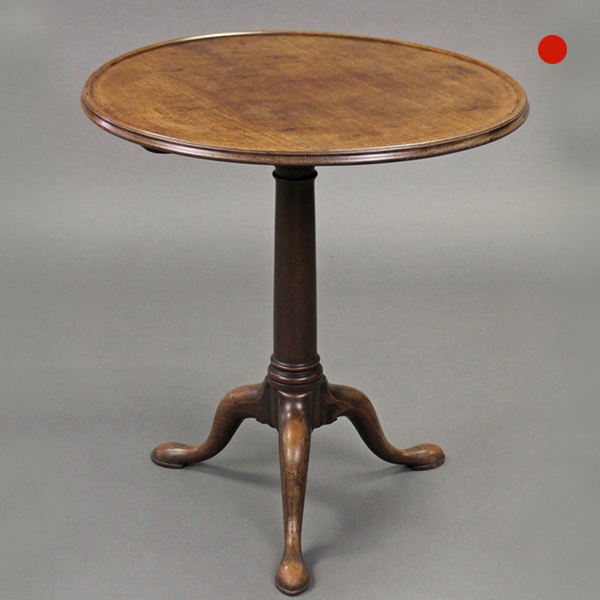
George III Mahogany Gun Barrel Tray Top Tripod Table Sofa Table Chippendale Period
A George III Mahogany Gun Barrel Tray Top Tripod Table, Sofa Table, Chippendale Period, circa 1770-1790, England. The circular tray top with moulded edge is raised on a gun-barrel centre column and cabriole legs with shaped pad feet.
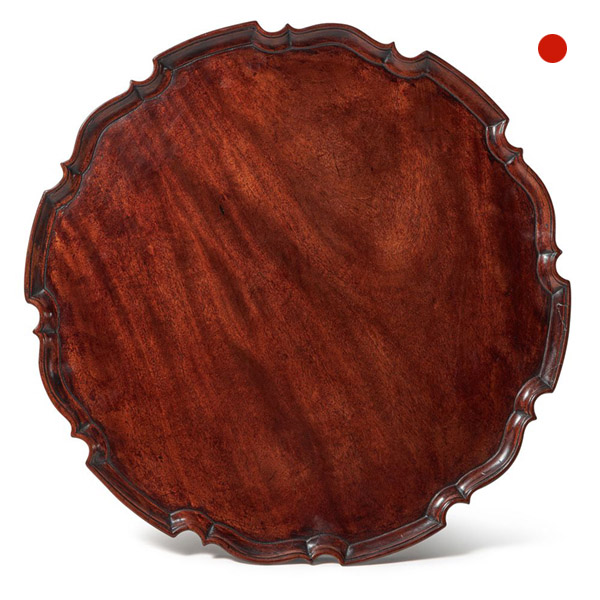
George III Chippendale Period Mahogany Pie Crust Tray
A fine George III Chippendale period mahogany pie crust tray, circa 1770, England. Of circular form, with a carved and shaped edge. Alexander George Fine Antique sell 18th & 19th century antique English furniture.
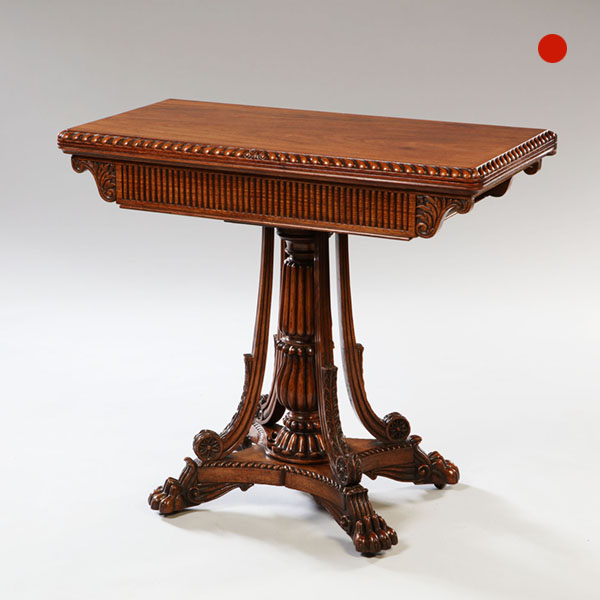
Solid Padauk Carved Anglo-Indian Card Table
Solid Padauk Carved Anglo-Indian Card Table. With the growth of trade and military power, the East India Company encouraged its British male employees to create a community with mixed ancestry. The company paid 15 silver rupees to the mother of any child born of such marriages.

An extraordinary George I walnut armchair Circa 1725, England
An extraordinary George I walnut armchair of fabulous colour, form and patination. The chair is of the most lively shapes being either carved or turned.

A fine burr walnut George I dressing mirror. Circa 1715-25 England.
A fine burr walnut George I dressing mirror Circa 1715-25 England. SoldFollow UsA fine burr walnut George I antique dressing mirror An extremely rare and fine George I burr walnut dressing mirror raised on ball and bracket feet. The drawer...

Charles II Japanned Cabinet of exceptional condition c. 1675 raised on a contemporary stand.
Charles II Japanned Cabinet of exceptional condition c. 1675 raised on a contemporary stand SOLD Follow UsCharles II Japanned Cabinet of exceptional condition c. 1675 raised on a contemporary stand An English Charles II Japanned cabinet of...

George III Mahogany Gun Barrel Tray Top Tripod Table Sofa Table Chippendale Period
A George III Mahogany Gun Barrel Tray Top Tripod Table, Sofa Table, Chippendale Period, circa 1770-1790, England. The circular tray top with moulded edge is raised on a gun-barrel centre column and cabriole legs with shaped pad feet.

George III Chippendale Period Mahogany Pie Crust Tray
A fine George III Chippendale period mahogany pie crust tray, circa 1770, England. Of circular form, with a carved and shaped edge. Alexander George Fine Antique sell 18th & 19th century antique English furniture.

Solid Padauk Carved Anglo-Indian Card Table
Solid Padauk Carved Anglo-Indian Card Table. With the growth of trade and military power, the East India Company encouraged its British male employees to create a community with mixed ancestry. The company paid 15 silver rupees to the mother of any child born of such marriages.
YOU MAY ALSO LIKE
No Results Found
The page you requested could not be found. Try refining your search, or use the navigation above to locate the post.
No Results Found
The page you requested could not be found. Try refining your search, or use the navigation above to locate the post.
